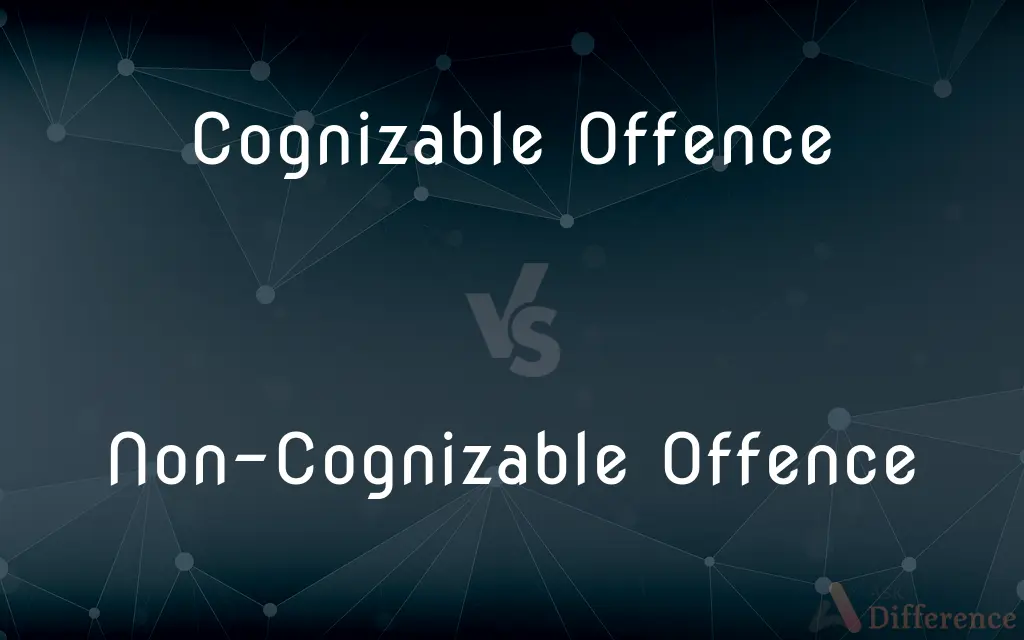Cognizable Offence vs. Non-Cognizable Offence — What's the Difference?
Edited by Tayyaba Rehman — By Fiza Rafique — Published on December 21, 2023
Cognizable Offence is serious, allowing police to arrest without a warrant; Non-Cognizable Offence is less severe, requiring a warrant for arrest.

Difference Between Cognizable Offence and Non-Cognizable Offence
Table of Contents
ADVERTISEMENT
Key Differences
Cognizable Offence refers to offenses deemed sufficiently severe by the law. These are typically heinous or serious crimes where the police have the authority to make an arrest without waiting for a court-issued warrant. On the flip side, Non-Cognizable Offence represents crimes that are less serious in nature. In these cases, police must obtain a warrant from a magistrate before making an arrest.
In the case of a Cognizable Offence, the immediacy of the situation often warrants swift action, which is why the police can act without a warrant. Such offenses might include murder, rape, or robbery. Contrarily, a Non-Cognizable Offence, such as defamation or simple assault, does not grant the police such immediate powers due to its less grave nature.
Understanding the distinction between Cognizable Offence and Non-Cognizable Offence is crucial for the proper functioning of the legal system. It ensures that serious crimes receive immediate attention while safeguarding individual rights in less severe situations. This differentiation also serves to prevent potential abuse of power by law enforcement agencies.
A Cognizable Offence can also lead to a more expedited judicial process. Given the severity of the crime, the accused may face stringent penalties or longer incarceration times. Meanwhile, a Non-Cognizable Offence usually carries lighter penalties and might even result in out-of-court settlements or fines rather than imprisonment.
The classification of offenses into Cognizable Offence and Non-Cognizable Offence is essential in delineating the powers of law enforcement. This system balances the need for swift justice in severe cases with the protection of individual rights in minor offenses.
ADVERTISEMENT
Comparison Chart
Warrant Requirement
No warrant needed for arrest
Warrant required for arrest
Severity
Serious crimes
Less serious crimes
Police Powers
Can initiate investigation without court orders
Requires court order to start investigation
Example Offenses
Murder, rape, robbery
Simple assault, defamation
Legal Response
Often leads to stringent penalties or longer incarceration
Usually results in fines or lighter penalties
Compare with Definitions
Cognizable Offence
An offense that demands immediate law enforcement response.
Arson, being a Cognizable Offence, results in swift police intervention.
Non-Cognizable Offence
Offense not deemed severe enough for immediate police action.
A minor public disturbance is often a Non-Cognizable Offence.
Cognizable Offence
Offense granting police the authority to initiate an investigation without court orders.
In cases of robbery, a Cognizable Offence, the police can immediately investigate.
Non-Cognizable Offence
Crime necessitating court orders for police to start investigations.
In cases of simple trespass, a Non-Cognizable Offence, police require legal directives.
Cognizable Offence
A crime classified as severe by legal standards.
Kidnapping is a Cognizable Offence due to its grave nature.
Non-Cognizable Offence
A crime where police require a warrant for arrest.
For defamation, a Non-Cognizable Offence, police need a magistrate's warrant.
Cognizable Offence
A crime serious enough for police to arrest without a warrant.
Murder is a Cognizable Offence, allowing immediate police action.
Non-Cognizable Offence
An offense usually associated with lighter penalties.
Causing a minor public nuisance, a Non-Cognizable Offence, might result in just a fine.
Cognizable Offence
Crime typically associated with stringent legal repercussions.
Due to its classification as a Cognizable Offence, armed theft can lead to long imprisonment.
Non-Cognizable Offence
Crime that doesn't empower the police for direct intervention.
Non-Cognizable Offences like verbal altercations need proper legal procedures before action.
Common Curiosities
What is a Cognizable Offence?
A Cognizable Offence is a serious crime allowing police to arrest without a warrant.
Why can police act immediately in Cognizable Offences?
The severity of a Cognizable Offence warrants swift action to ensure public safety and justice.
Can police initiate an investigation without a court order in Non-Cognizable Offences?
No, for a Non-Cognizable Offence, they need court orders to start an investigation.
Who decides the classification of these offenses?
The legal or penal code of a jurisdiction usually outlines the classification.
Can a person file a direct police complaint for Non-Cognizable Offences?
Typically, a formal legal complaint or court order is needed first.
Are penalties heavier for Cognizable Offences?
Generally, yes, due to their severe nature.
Why is the distinction between the two important?
It balances swift justice needs with protection of individual rights.
Are Cognizable Offences bailable?
Not always; many Cognizable Offences are non-bailable due to their gravity.
How does a Non-Cognizable Offence differ from a Cognizable Offence?
In a Non-Cognizable Offence, police require a warrant for arrest, unlike a Cognizable Offence.
Can a Non-Cognizable Offence become Cognizable?
In some legal systems, with certain conditions or repeated offenses, it might be possible.
Is immediate police action guaranteed for all Cognizable Offences?
While the law permits it, actual response can vary based on circumstances and resources.
Which offense type is more common?
It varies by jurisdiction, but Non-Cognizable Offences, being less severe, might be more frequent.
How do police handle Non-Cognizable Offences?
They usually require a formal complaint and a court directive to proceed.
Is public safety a factor in these classifications?
Yes, Cognizable Offences often represent immediate threats to public safety.
Can these classifications change over time?
Yes, legal systems evolve, and offenses can be reclassified based on societal needs and changes.
Share Your Discovery

Previous Comparison
SN1 vs. SN2
Next Comparison
Step Siblings vs. Half SibilingsAuthor Spotlight
Written by
Fiza RafiqueFiza Rafique is a skilled content writer at AskDifference.com, where she meticulously refines and enhances written pieces. Drawing from her vast editorial expertise, Fiza ensures clarity, accuracy, and precision in every article. Passionate about language, she continually seeks to elevate the quality of content for readers worldwide.
Edited by
Tayyaba RehmanTayyaba Rehman is a distinguished writer, currently serving as a primary contributor to askdifference.com. As a researcher in semantics and etymology, Tayyaba's passion for the complexity of languages and their distinctions has found a perfect home on the platform. Tayyaba delves into the intricacies of language, distinguishing between commonly confused words and phrases, thereby providing clarity for readers worldwide.
















































